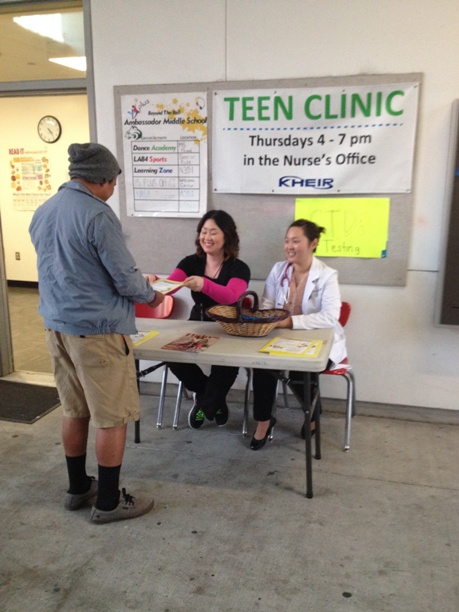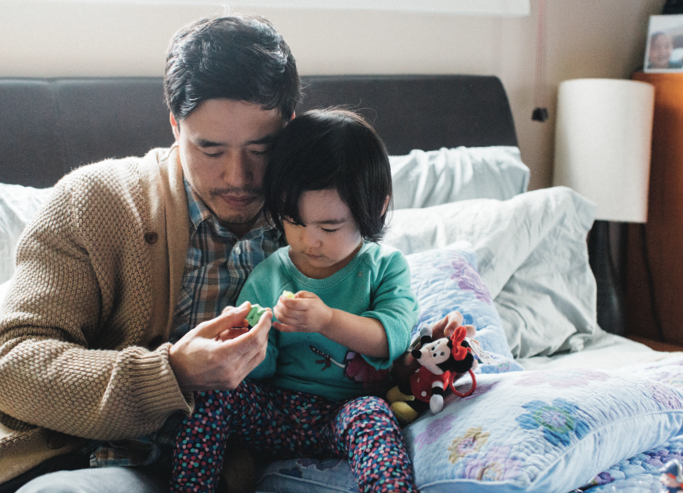The truth about vaccines: they save lives!
Immunizations available for newborns, kids and adults at Kheir Clinic
Above photo: Medical Assistant Hanna Shin administers a vaccination to a patient at Kheir’s on-site lab.
by DAMIAN KELLY
Vaccinations have come under attack in recent years, leading to a troubling decrease in the number of U.S. parents delaying or refusing vaccines for their children, according to the U.S. National Library of Medicine. The issue is controversial for many people who are unsure what to believe about the benefits and risks of immunizations, but the truth is that vaccinations are critically important for preventing deadly diseases.
One reason for the decline in immunization rates is a 1998 study by U.K. Doctor Andrew Wakefield, which claimed that the measles, mumps and rubella vaccine could potentially alter a child’s immune system, causing intestinal problems, brain damage and autism. Although the study was widely rejected and Wakefield lost his license, the study continues to have an impact.
While the nationwide rate of vaccination against childhood diseases is around 91 percent, the rates of inoculation in certain parts of the United States are considerably lower, decreasing the national average and creating concern among local public health departments. The plummeting numbers may be attributed to generations of Americans who grew up in a time after the eradication of diseases like measles and polio; some individuals interpret the absence of these diseases in our society as a sign that they are no longer a threat.
Communities that have a vaccination rate of 95 percent or lower are at risk for an outbreak of a disease, according to a New York Times article. Called “herd immunity,” a high rate reduces the likelihood that a person infected with a disease will endanger someone who could be vulnerable, such as a child whose parents rejected immunizations or a baby too young for inoculations.
The recent measles outbreak at Disneyland in Anaheim, California, brought the low vaccination rate into sharp focus when at least 40 people who visited or worked at the theme park contracted measles. The disease has since been spread to at least six other states.
Despite what anti-vaccination activists may say, immunization has been proven by scientists, doctors and health professionals to be safe and effective, according to the U.S. Department of Health and Human Services. Serious side effects to immunizations such as an allergic reaction are rare, and the disease-prevention benefits of being inoculated are much greater than the possible side effects for almost all children. In addition, immunizations are often required before children can begin attending schools and/or child care facilities.
Kheir Clinic is here to help ensure children and adults receive required shots at a free or affordable rate. Vaccinations to protect children against such diseases as measles, mumps, meningitis, chickenpox, tetanus and Hepatitis A are available at no cost to children through the Vaccines for Children (VFC) program. Every immunization that a child receives through the VFC program is recorded electronically in Los Angeles County’s CAIR registry. The registry also alerts health center staff of upcoming vaccinations for VFC program participants. This is especially helpful for children from families that are homeless to ensure they receive all their required inoculations in a timely manner.
Children aged 18 years or younger are eligible for the VFC program if they are eligible for Medi-Cal or the Child Health and Disability Program (CHDP), are uninsured or are American Indian or an Alaskan Native. Vaccinations such as Hepatitis B, Td, Tdap and Influenza are also available to adults at no or low cost.
Vaccinating your children is more important than ever in light of decreasing immunization rates and measles outbreaks. Take action against disease, keep our community safe and healthy, and visit Kheir Clinic today to make sure your children maintain a clean bill of health.
To make an appointment for no and low cost services, please call Kheir Clinic at (213) 637-1070.
___







